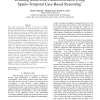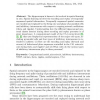288 search results - page 12 / 58 » Learning to Play Chess Using Temporal Differences |
120
Voted
ICRA
2002
IEEE
15 years 7 months ago
2002
IEEE
This paper presents an approach to learning an optimal behavioral parameterization in the framework of a Case-Based Reasoning methodology for autonomous navigation tasks. It is ba...
204
click to vote
ICCV
2009
IEEE
16 years 7 months ago
2009
IEEE
We present a novel approach for detecting global behaviour
anomalies in multiple disjoint cameras by learning
time delayed dependencies between activities cross camera
views. Sp...
105
click to vote
AIM
1998
15 years 2 months ago
1998
A computer program that uses AI planning techniques is now the world’s best program for the game of contract bridge. As reported in The New York Times and The Washington Post, t...
115
Voted
NIPS
1996
15 years 3 months ago
1996
Although TD-Gammon is one of the major successes in machine learning, it has not led to similar impressive breakthroughs in temporal difference learning for other applications or ...
139
click to vote
ICANN
2010
Springer
15 years 12 days ago
2010
Springer
The hippocampus is known to be involved in spatial learning in rats. Spatial learning involves the encoding and replay of temporally sequenced spatial information. Temporally seque...



